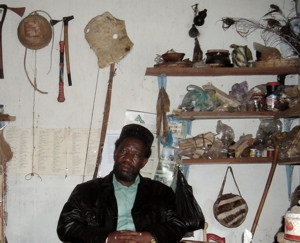
Dr. Vongo clearly gets a kick out thinking people don't expect him to use a power point presentation to tell his story. He also enjoys pointing out that in a recent conference on leadership in the Zambia AIDS epidemic, he was one of the only -- if not the only -- speaker to stay within the 15-minute time limit.
"People think of us as the bad news," he says with a chuckle.
By "us" he means traditional healers -- the herbalists, diviners, spiritual counselors and birth attendants that 80 percent of people seeking health care turn to first in Zambia. And for that reason it's the only thing he says that sounds less than well-founded.
There are at least 40,000 of people with the expertise that he and others seek to standardize and regulate under the auspices of THPAZ -- Traditional Healing Practitioners Association of Zambia, as opposed to fewer than 1,000 physicians with the letters M.D. after their names (with the numbers diminishing fast with doctors' defections to non government organizations and American jobs).
The idea of organizing traditional healers predates the AIDS epidemic; THPAZ started in 1978, and could be considered part of an ongoing celebration of independence from colonialism here that began in 1964. But it is arguably more important than ever to, as Dr. Vongo puts it, "bring some sanity to the practice," in the continued rampage of the epidemic that feeds other epidemics and highlights the faultlines in health care and social justice every where it feeds.
Dr. Vongo was well into his calling as a traditional healer by then, having trained with his grandfather, served as his apprentice when the elder man lost his eyesight, and finally given up a job that he says supported his family well, using his termination payment to buy the farm where he practices today. I went there while waiting for my work permit, in a continuing effort to meet people leading efforts in health care here. I visited the massive, and research-drawing University Teaching Hospital the same week.
Say what you will about the miracles of modern medicine, the bounty it has yielded to fight the current crop of epidemics — AIDS, TB, Cholera, Cancer (all big concerns here), and the fact that a hospital is still likely to be the first stop for me and my loved ones — I defy anyone not to feel more comfortable in Dr. Vongo's consulting room, breathing the fresh air of dried herbs, and the most jolting sound around that of a guava hitting the tin roof above. In addtion there is this: "We want traditional medicine to be the cheapest source of community health care," he says.
The accessibility that implies, as well as acknowedged success in African traditional healing -- it was the first field to use quinine to treat malaria effectively -- underscores the impetus of one part of THPAZ's mission: "We should enhance the referral mechanism," Dr. Vongo says. By that he means physicians referring to healers when they have failed or an illness falls outside of their expertise (at the recent conference Dr. Vongo gave the example of someone who still can't get a girlfriend, while all his friends are getting married).
It also means healers referring patients to other healers. And it means healers referring patients to physicians — particularly critical for patients with HIV. "AIDS has come like a conduit for collaboration," he says. "The AIDS pandemic has brought us together." It remains an uneasy collaboration in many corners, with traditional healers still hurting from years of punitive colonial laws -- that still remain on the books, Dr. Vongo says, citing page and chapter, as well as modern skepticism and sterotype while modern practitioners respond sharply to claims unsubstantiated by current scientific method for cures and treatments.
Dr. Vongo says his story is one of tradition, but also the future. He points to a pile of filled notebooks at his feet. "Our forefathers didn't document," he says. "I do. I don't want this knowledge to die with me."